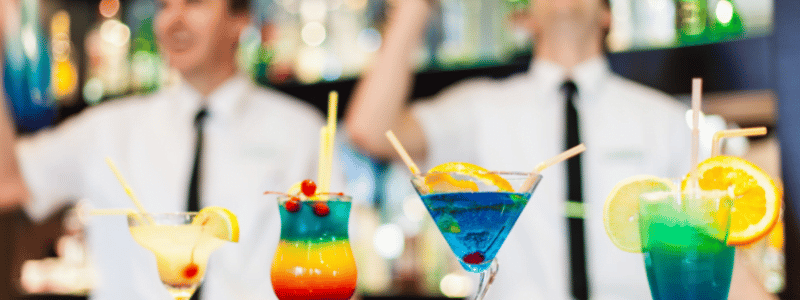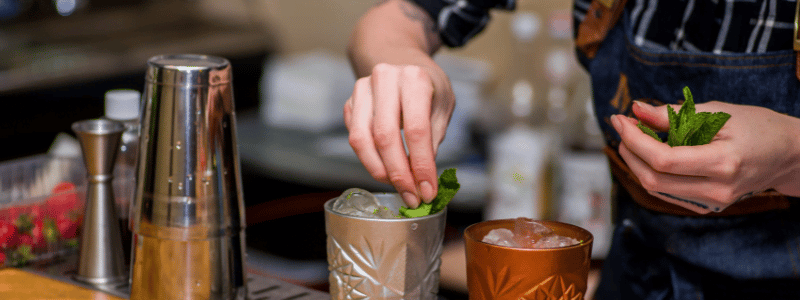There’s a meme floating around the internet that says: Sometimes you run into people who change your life for the better. Those people are called bartenders. Certainly, a bar functions as more than an after-work special and a neatly crafted cocktail to balance the stressors of life with feel-good moments. Quality alcoholic beverages can elevate the most brutal of days. And behind the perfectly shaken orgeat, and imaginative lemon gum syrups–eliciting feelings of care-free nostalgia–are those life-changing bartenders. Crafters of unique blends, shakes, stirs, and pours, these dedicated professionals work to care for their patrons, just as a therapist would for a client. Exactly, what makes a good bartender? Are all bartenders created equal?
We know that bar life can be a busy one. Behind the glamour of working in the hottest nightclubs and casual neighborhood pubs are servers who have perfected the art of alcohol. But beyond flashy techniques and their abundance of knowledge in drink recipes, great bar keepers are constantly looking for an edge that separates them as vets from newbs. The differences can be strikingly apparent.

What Goes Into a Great Cocktail?
A great cocktail has an ease about it that makes it irresistible, sparking word-of-mouth marketing that can draw in crowds from around the city, country, and even globe. A perfectly balanced mix of alcohol, unique flavors, and aromas is a big deal for bars nationwide. It can serve as a staple for the establishment. It can provide the taste of expectations for patrons and newcomers alike. More than this, nailing a great cocktail helps to increase revenue for bars ten-fold.
Selecting ingredients, however, is only half the battle. The other half is understanding the qualities that make a great bartender who, among other things, assumes responsibility for crafting the very best branded drinks.
The Role of the Bartender
The role of bartender, also called barman, barmaid, mixologist, publican, tapster, or dude-who-slangs-brew, is demanding, diverse, and fast-paced. What makes a good bartender is their ability to adapt, serve, and nurture relationships that keep patrons engaged and returning. No matter how you slice or shake it up, it’s definitely not an easy undertaking. From one Diageo Bar Academy’s bartender’s perspective in beverage crafting:
I discovered that in order to make the best Manhattan with any whiskey, I needed to first understand the choices of ratios, vermouths, bitters and cocktail garnishes.
Great bartenders are, arguably, much like scientists. A great cocktail, according to Los Angeles Magazine, is made up of the following components:
- Foraging for the best ingredients
- Flavor profiling and combining the right spirits
- Building on classic cocktails
- Possessing good quality liqueur
- Creating basic sours (keep it simple)
- Light touches of juice
- Free pouring spirits for time saves
- Rule following for shaking, stirring, and blending
- Perfecting the garnish and presentation
- Creating overall balance
There are thousands of cocktail blends and most of them are promoted and showcased online. Bartenders can be true wizards of their craft, turning wine into exquisite champagnes, or pepper into expensive cognac. What makes a good bartender are the factors that suggest patrons don’t need to understand the nitty-gritty details of a cocktail, only that it’s great enough to spend their hard-earned money.

The Making of a Great Bartender
One of the greatest myths about cocktails is that they’re difficult to make. Well, is making a pizza from scratch worth the time? Absolutely! All of the joy and excitement you get out of cooking can be found in the bar as well. What makes a good bartender, first and foremost, is the passion behind the craft.
Passion for Craft Liquor
A bar is filled with opportunities for anyone who enjoys a good project. From homemade syrups and liqueurs to infusing new, never-heard-of flavors into your distilled spirits. Really, the possibilities here are endless. What we’ve found is that the world’s greatest bartenders are all about their signature crafter and their endless pursuit of perfecting it. Fresher ingredients, premium liquors, and impeccable presentations are what win awards and also bigger tabs.
There are very good reasons why bartenders use certain tips and tricks and why they pay attention to particular aspects of mixing drinks. The theory of the bar is filled with seemingly random advice but it all serves the purpose of making every drink just a little bit better.
Great bartenders are extremely attentive to detail. They are almost always motivated by how well a patron receives their elixir. Are they happy? Are they delighted? Are they amazed enough to post it on their social media channels? All of these factors are important in addressing what makes a good bartender. For most great bartenders, they simply love what they do and it shows.
Not unlike chefs, bartenders are unique crafters of the best mixes. They work overtime to incorporate amazing ingredients with the country’s favorite liquors.

Impeccable Customer Service
Receiving mediocre or terrible service at any establishment can be incredibly frustrating. As some might say, it kills the vibe. One of the best traits in any good bartender is their ability to listen and relate to their customers.
A good bartender can elevate a guest’s dining experience or can leave them frustrated, annoyed, and sober.
Part of a bartender’s job description is, in fact, more than the years of mixology experience they probably have under the apron. A barkeep should also facilitate and nurture friendly and lively bar environments where people feel comfortable enough to share their life stories, or – at a minimum – willing to spend a few extra dollars on upgrading from a well-drink to a premium beverage.
What makes a good bartender? Employees that are constantly monitoring guests. They know when someone needs a drink, they know who needs what drink, and they’re very attentive to the needs of their patrons. Staying relaxed and with a calm demeanor allows bartenders to keep an open focus and be ready to handle any issues.
Most veteran bartenders elevate a guest’s dining experience with their bright personalities and years of mixology and customer service experience. Legendary bartenders are also much like therapists, offering life advice, or being an ear to listen to the troubles of any given day.
Knowledge of Drinks
It can be somewhat intimidating to order drinks from a bartender. It’s part of the reason that most of us will sit down and order our comfortable cocktail, even those that we’re not particularly excited to drink. To avoid sounding like a newb, we’ll ask for a simple vodka soda, as opposed to the Vesper or a Gibson.
A good bartender, though, accepts the challenge on behalf of their patrons. They use certain orders as cues to offer alternative, premium drinks. They may say: “Vodka sodas are great, have you ever tried a Gimlet?” Indeed, a Gimlet is not all that different from a vodka-soda, but it blends the ease of lime flavors that make it a more sophisticated cocktail.
What this boils down to is a bartender’s knowledge of drink orders. Not only do they have to stay on their toes, but they have to read orders and call up suitable alternatives that make a patron excited for the possibility of trying something new. Stepping out of that comfort zone they’ve grown accustomed to.
Gloworder Celebrates Great Bartending Skills
In the business of bars, we realize every factor counts. What makes a good bartender, makes a great bar. We celebrate the wins for bartenders nationwide and are excited by the prospect of highlighting the best, premium beverages that spark excitement for patrons.
Gloworder is a simple tool that bartenders can use to highlight their own skill sets. To learn more about our new app, join our waitlist here.
